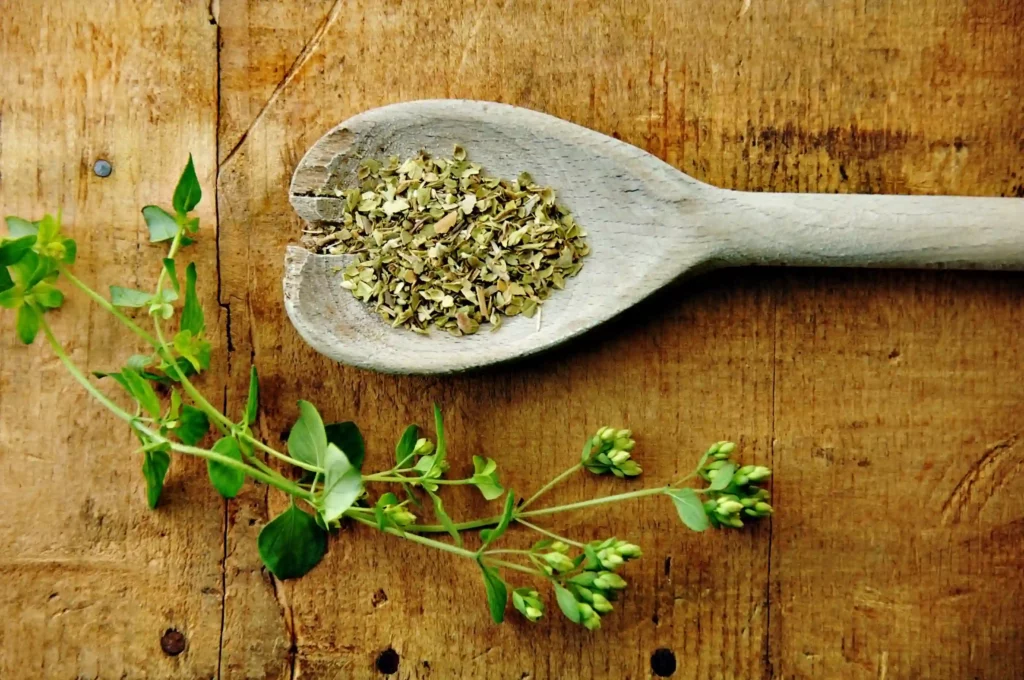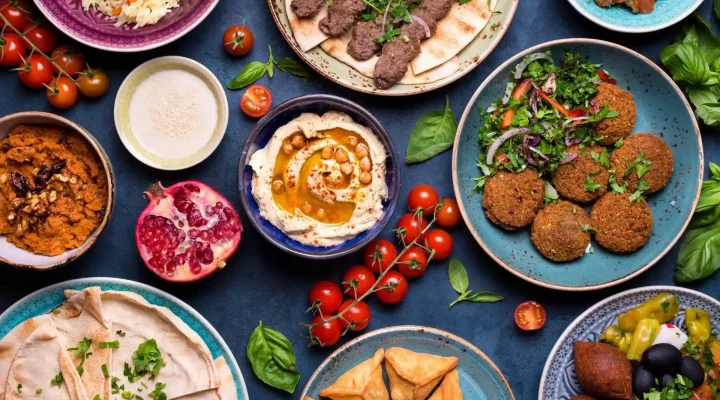If you love Mediterranean food, get ready for an exploration comparing Turkish vs Greek food.
Let’s see what makes each of these food traditions unique. We’ll explore their common ingredients and dishes, as well as their special flavors and cultural influences.
Along the way, we’ll talk about how Mediterranean food can be good for you. It’s packed with nutrients that can boost your health in all sorts of ways. Plus, we’ll share easy tips on how you can start enjoying Mediterranean dishes as part of your everyday meals.
Key Takeaways
- Similarities & Differences: Both use olive oil, yogurt, & herbs, but Turkish cuisine leans spicier with red pepper & cumin, while Greek favors oregano & mint.
- Health Benefits: The Mediterranean diet promotes heart health, and weight management, & may reduce risks of diabetes & some cancers.
- Incorporate at Home: Use fresh herbs & marinades with olive oil, & enjoy vegetables for a well-rounded meal.
Table of Contents
ToggleThe Mediterranean Cuisine


The Mediterranean Cuisine is well-known for its numerous health benefits, delicious flavors, and deep culinary history. It is based on the traditional eating patterns of countries surrounding the Mediterranean Sea, like Greece and Turkey.
Overview of the Region’s Cuisine History


Mediterranean cuisine, a blend of Greek and Turkish culinary traditions, is celebrated for its delicious and varied flavors.
Long ago, around 2700 BC, the Minoans settled in Greece and kickstarted what we now know as Mediterranean food. They grew grains like wheat and barley and were the first to make olive oil and wine from wild grapes. Their diet was heavy on plants, but they also raised animals and enjoyed plenty of seafood, a big part of Greek cooking even today.
Turkish cuisine, on the other hand, has deep roots in the expansive Ottoman Empire (1299-1922). Spanning across three continents, the empire soaked in flavors from Central Asia, Persia, the Balkans, and Arabia. This mix introduced new foods like potatoes, tomatoes, and spices to Turkish kitchens, making their dishes more diverse and flavorful. The Ottomans also picked up coffeehouses and added tasty treats like Greek wine and Persian desserts to their menu.
Similarities Between Turkish vs Greek Food
Turkish and Greek cuisines share many similarities. They both use fresh ingredients and traditional cooking techniques, creating a variety of beloved dishes that highlight the delicious flavors of the Mediterranean region.
Shared Ingredients and Dishes


Both Turkish and Greek cuisines love using ingredients like olive oil, yogurt, and an assortment of fresh herbs and spices. These elements come together to create tasty and healthy traditional dishes such as baklava, kebabs, and dolma.
- Olive Oil: It’s a must-have in Turkish and Greek kitchens, perfect for sautéing, making salad dressings, and adding a final touch to dishes.
- Yogurt: This creamy delight enhances flavors in Greek tzatziki and Turkish cacık, giving them a tangy kick.
- Fresh Herbs: Mint, parsley, and dill bring freshness and depth to dishes like Greek spanakopita and Turkish börek, making them burst with flavor.
Differences Between Turkish vs Greek Food
While Turkish and Greek cuisines share many similarities, they also have distinct differences in flavors, ingredients, and cooking methods that highlight each culture’s unique culinary traditions.
Distinct Flavors and Influences


- Turkish Cuisine: It’s all about bold spices like red pepper and cumin, adding a robust kick to dishes like kebabs.
- Greek Cuisine: Fresh and aromatic herbs like oregano and mint define Greek dishes, imparting a delicate and flavorful touch.
These distinct flavor profiles shine through in popular dishes. Turkish kebabs are known for their spicy seasoning, creating a bold flavor experience. In contrast, Greek spanakopita showcases the subtle yet vibrant flavors of herbs like spinach and feta in a savory pastry.
Popular Turkish Dishes
Turkish cuisine is famous for its wide array of dishes, including classics like kebabs, börek, and dolma. These traditional recipes vary by region, showcasing Turkey’s rich culinary heritage.
Traditional Recipes and Variations


Traditional Turkish dishes like kebabs, börek, and dolma hold a special place in many hearts, offering a taste of Turkey’s diverse culinary heritage and regional diversity.
Consider kebabs, for example; whether made with tender lamb, juicy chicken, or a mix of colorful vegetables, each variation brings its own unique flavors to the dish.
Every region of Turkey adds its own twist to these beloved recipes, from the choice of spices to the cooking methods used, creating a mosaic of flavors and textures that invite discovery and enjoyment.
Popular Greek Dishes
Greek cuisine is celebrated for its fresh and flavorful dishes like moussaka, souvlaki, and Greek salad, all steeped in tradition and highlighting Greece’s rich culinary legacy.
Traditional Recipes and Variations


Traditional Greek recipes like moussaka, souvlaki, and Greek salad are famous dishes that offer a flavorful glimpse into the country’s culinary heritage. Each dish reflects regional preferences, showcasing variations in preparation.
Take moussaka, for example; it can vary by region, with some using eggplant as the base layer and others opting for potatoes. The secret to a delicious moussaka lies in the creamy bechamel sauce generously layered over its components.
Health Benefits of Mediterranean Cuisine
The Mediterranean diet is well-known for its many health benefits. It offers a balanced and nutritious eating plan that may reduce the risk of chronic diseases and contribute to overall well-being.
Nutritional Value and Potential Health Improvements
The Mediterranean diet is packed with nutrition because it emphasizes whole foods, healthy fats like olive oil, and lean proteins. People who follow this diet can enjoy a range of health benefits, such as:
- Healthy fats from olive oil and fiber from whole grains
- Antioxidants found in fresh fruits and vegetables
- Lower risk of heart disease
- Potential for weight management
- Benefits for brain health
- Reduced risk of type 2 diabetes and some cancers
How to Incorporate Mediterranean Food into Your Diet
Exploring Mediterranean cuisine in your diet can be a delightful and rewarding journey. By picking up cooking tips and enjoying meals, you can fully embrace the flavors and health benefits of this esteemed culinary tradition.
Tips for Cooking and Eating Mediterranean Style
To elevate your Mediterranean dishes at home, try using fresh herbs such as basil, oregano, and parsley. Marinate meats in a blend of olive oil, garlic, and lemon juice before grilling or roasting to enhance their flavor and tenderness.
Take pleasure in your meals by eating slowly, savoring each bite, and sharing them with loved ones. This can enhance the dining experience, foster a sense of community, and contribute to overall well-being. For authentic Turkish food, you might want to visit Cazbar, Maryland’s first Turkish restaurant, for a truly exceptional dining experience!
Frequently Asked Questions
What is the difference between Turkish and Greek food?
Turkish and Greek foods may have some similarities, but they also have distinct differences. Turkish cuisine is more heavily influenced by Middle Eastern and Central Asian flavors, while Greek cuisine is more influenced by Mediterranean and Balkan flavors.
Which cuisine is considered healthier, Turkish or Greek?
Both Turkish and Greek cuisines are generally considered healthy because they use fresh ingredients and incorporate a lot of vegetables, legumes, and lean proteins. However, Greek cuisine may be slightly healthier due to its emphasis on olive oil and seafood.
What are some popular dishes in Turkish and Greek cuisine?
Some popular dishes in Turkish cuisine include kebabs, dolma, and baklava. In Greek cuisine, popular dishes include moussaka, souvlaki, and spanakopita.
Is Greek and Turkish food suitable for vegetarians?
Both Greek and Turkish cuisines have a variety of vegetarian options, with many dishes featuring vegetables, legumes, and cheeses. However, Turkish cuisine tends to have more meat-based dishes, while Greek cuisine has a larger variety of vegetarian options.
Which cuisine is spicier, Turkish or Greek?
Turkish cuisine is generally considered spicier, as it incorporates a lot of spices such as cumin, paprika, and red pepper flakes. Greek cuisine uses more herbs and less spices, making it milder in comparison.
Are there any common ingredients used in both Turkish and Greek cuisine?
Yes, there are some common ingredients used in both Turkish and Greek cuisine, such as olive oil, yogurt, feta cheese, and phyllo dough. Both cuisines also use a lot of fresh herbs and vegetables in their dishes.







